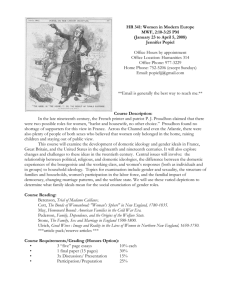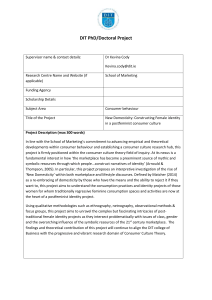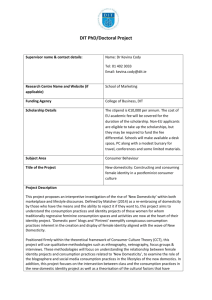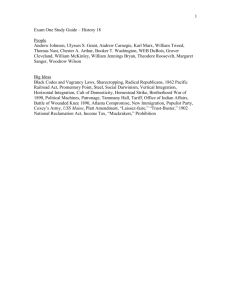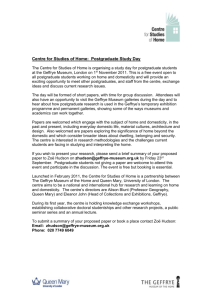History A551:
advertisement
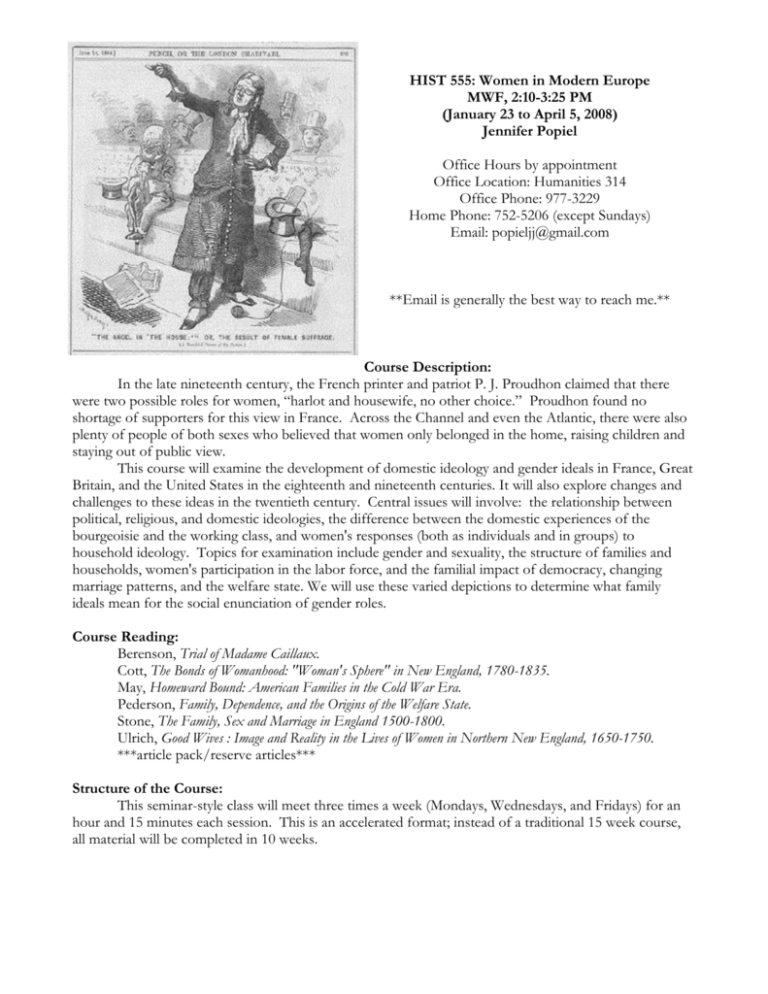
HIST 555: Women in Modern Europe MWF, 2:10-3:25 PM (January 23 to April 5, 2008) Jennifer Popiel Office Hours by appointment Office Location: Humanities 314 Office Phone: 977-3229 Home Phone: 752-5206 (except Sundays) Email: popieljj@gmail.com **Email is generally the best way to reach me.** Course Description: In the late nineteenth century, the French printer and patriot P. J. Proudhon claimed that there were two possible roles for women, “harlot and housewife, no other choice.” Proudhon found no shortage of supporters for this view in France. Across the Channel and even the Atlantic, there were also plenty of people of both sexes who believed that women only belonged in the home, raising children and staying out of public view. This course will examine the development of domestic ideology and gender ideals in France, Great Britain, and the United States in the eighteenth and nineteenth centuries. It will also explore changes and challenges to these ideas in the twentieth century. Central issues will involve: the relationship between political, religious, and domestic ideologies, the difference between the domestic experiences of the bourgeoisie and the working class, and women's responses (both as individuals and in groups) to household ideology. Topics for examination include gender and sexuality, the structure of families and households, women's participation in the labor force, and the familial impact of democracy, changing marriage patterns, and the welfare state. We will use these varied depictions to determine what family ideals mean for the social enunciation of gender roles. Course Reading: Berenson, Trial of Madame Caillaux. Cott, The Bonds of Womanhood: "Woman's Sphere" in New England, 1780-1835. May, Homeward Bound: American Families in the Cold War Era. Pederson, Family, Dependence, and the Origins of the Welfare State. Stone, The Family, Sex and Marriage in England 1500-1800. Ulrich, Good Wives : Image and Reality in the Lives of Women in Northern New England, 1650-1750. ***article pack/reserve articles*** Structure of the Course: This seminar-style class will meet three times a week (Mondays, Wednesdays, and Fridays) for an hour and 15 minutes each session. This is an accelerated format; instead of a traditional 15 week course, all material will be completed in 10 weeks. Course Requirements/Grading (Graduate Option): • 3 “five” page essays 10% each • 1 final paper (15-20 pages) 30% • 3x Leading Discussion 15% • Participation/Preparation 25% In addition to attendance and participation, requirements for the course include three “five” pages essays (topic to be determined by you) and a final paper (topic to be determined in conjunction with the instructor). Your final paper will certainly involve some research beyond the course readings; how much research will depend on the paper topic. All essays must be turned in by hard copy and electronically to popieljj@gmail.com. All essays must have one inch margins and be typed and double-spaced, in a 12 point proportional font (such as Times New Roman). You will also be required to lead discussion in class three times. Discussion Topics and Reading List Section One: Overview of the Problem January 23 – Overview of Domesticity January 25 – The Classic View: Public and Private Women. On Blackboard, read: Welter, “Cult of True Womanhood,” and “Kerber, “Separate Spheres, Female Worlds,” and Pateman, “Sex and Power.” On eReserve, read Landes, “Introduction,” and “Rousseau’s Reply.” January 28 – Challenges to the Classic View. On Blackboard, read Lasser, “Beyond Separate Spheres,” Hunt, “Reading the French Revolution,” and Desan, “War Between Brothers and Sisters.” Borrow Heuer, Family and Nation in order to read the Introduction. Section Two: The Advent of Domesticity: Religion, Work, Sex, and Family Life January 30 – Colonial Life, Domesticity, and Huswifery. Read Ulrich, Good Wives, first half (through Chapter Six, Consort). February 1 – Colonial Life, cont. Read Ulrich, Good Wives, second half, to end. February 4 – The Affectionate Family , Economic Change, and Sexual Liberation in Great Britain. Read Stone, The Family, Sex and Marriage in England, Chapters 1, 2, 3 and 5. February 6 – The Affectionate Family , cont. Read Stone, The Family, Sex and Marriage in England, Chapters 6 - 9. February 8 – The Affectionate Family , cont. Read Stone, The Family, Sex and Marriage in England, Chapter 13. On Blackboard, read McCall, “Reign of Brute Force,” and Shammas, “Domestic Environment.” February 11 – Domesticity, Civisme, and the Feminine Ideal in France. Get a complete copy of Popiel, Rousseau’s Daughters from Dr. Popiel. Read Introduction through end of Chapter Two. February 13 – Domesticity, cont.. Read Popiel, Rousseau’s Daughters, through end of Conclusion. February 15 – First Essay Due to History Department by 2 pm (no class held). Section Three: Internalizing Domesticity: Economics, Religion, and “Private” Behavior 2 February 18 – The Market Revolution and the Cult of Domesticity in New England. Read Cott, The Bonds of Womanhood, through page 101 (Chapter 3, Education). February 20 – The Market Revolution, cont. Read Cott, The Bonds of Womanhood, to end. February 22 – The Cult of Domesticity expands. On Blackboard, read Darrow, “French Noblewomen,” Clark, “Chartist Domesticity,” and Zlotnick, “Thousand Times,” and Wahrman, “Middle-Class Domesticity.” February 25 – Private Behavior, etc., cont. On eReserve, read Davidoff and Hall, all. Borrow Bonnie Smith, Ladies of the Leisure Class from Dr. Popiel and read Introduction, Chapters 1, 2, 7, 8, and 9. February 27 – Private Behavior, etc., cont. On Blackboard, Read Ford, “Private Lives, Public Order,” Rappaport, “Halls of Temptation,” and Tosh, “Masculinities.” February 29 – Second Essay Due to History Department by 2 pm (no class held). Section Four: Moving Beyond Family, Past Domesticity? March 3 – Domesticity, Passion, and the Ideal Woman. Read: Berenson, Trial of Madame Caillaux, Prologue and Chapters 1 and 2. March 5 – Domesticity, Passion, and the Ideal Woman. Read: Berenson, Trial of Madame Caillaux, Chapters 3 and 4. March 7 – Domesticity, Passion, and the Ideal Woman. Read: Berenson, Trial of Madame Caillaux, Chapters 5 and 6 and Epilogue and on Blackboard, read Nye, “ Fencing.” March 10 – Maternity and the Government. Read Pederson, Family, Dependence, and the Origins of the Welfare State : Britain and France, 1914-1945, Chapters 1 and 2. March 12 – Maternity and the Government. Read Pederson, Chapters 3 and 5. March 14 – Maternity and the Government. Read Pederson, Chapters 6, 7, and Conclusion.. March 26 – The Cold War and the Family. Read May, Homeward Bound: American Families in the Cold War Era, Introduction through end of Chapter 5. March 28 – Cold War, cont. Read May, Homeward Bound: American Families in the Cold War Era, Chapter 6 to end. March 31 – Third Essay Due to History Department by 2 pm (no class held). April 2 – Beyond Domesticity, I. On Blackboard, read Scott, “Gender: A Useful Category of Analysis,” Harrison and McMillan, “Feminist Betrayals,” and Meyerowitz, “Beyond the Feminine Mystique,” April 4 – Beyond Domesticity, II. On Blackboard, read Sklar, “A Call For Comparisons,” Kerber et al, “Beyond Roles, Beyond Spheres.” FINAL PAPER DUE TO HISTORY DEPARTMENT BY 2 PM ON APRIL 11. 3
